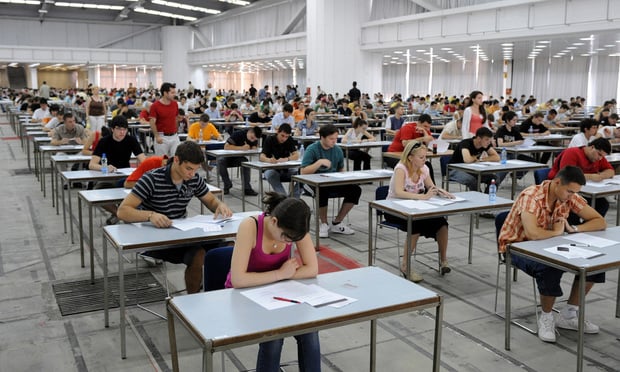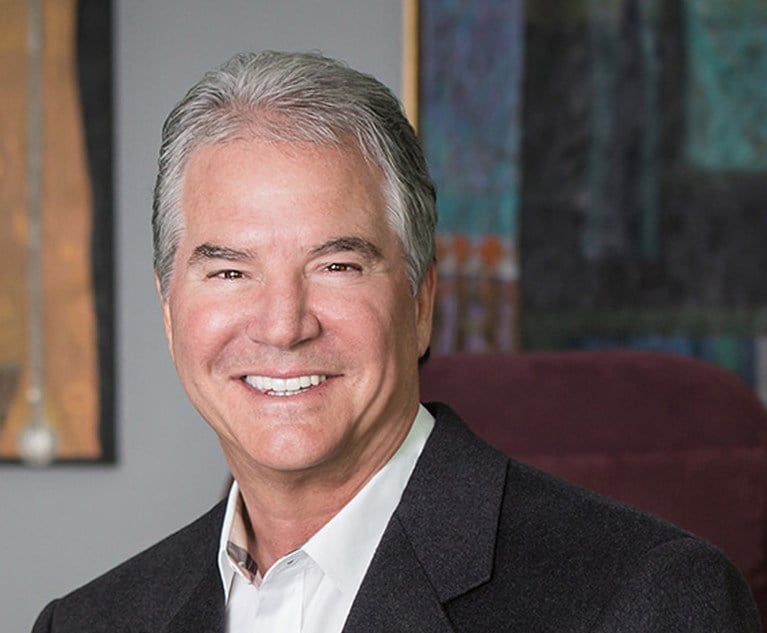Nearly 7 in 10 Flunked California's February 2019 Bar Exam
Still, the success rate—31.4%—increased 4.1 percentage points from the historically low pass rate of 27.3% recorded in February 2018.
May 17, 2019 at 09:56 PM
4 minute read

Only 31.4% of would-be attorneys passed California's February 2019 bar exam, marking the second-lowest pass rate on the notoriously difficult test in 35 years, according to figures released by the state bar Friday night.
The success rate was 4.1 percentage points higher than the historically low pass rate of 27.3% recorded in February 2018.
The rise mirrors improvements seen in other states, including New York, Pennsylvania, Texas and Virginia, where pass rates ranged from 54% to 72%. The national average score on the February Multistate Bar Exam, the multiple-choice section of the test, ticked up 1.2 points to 134.
“We are encouraged to see the increase in pass rate over last year,” bar executive director Leah Wilson said in a prepared statement. “However, the overall low pass rate continues to be a concern and a focus here in California.”
California's high failure rate is sure to add new fuel to efforts to lower the score required by the state bar to pass the exam, a figure known as the cut score. At a legislative hearing in Sacramento this week, L. Song Richardson, dean of the UC Irvine School of Law, argued that the second-highest-in-the-nation passing score delays otherwise qualified law graduates from entering the profession and hampers efforts to diversify the bar's membership.
The bar for the second year is offering an online program to help applicants prepare for the July exam. The bar will also conduct a survey of attorneys this summer to gauge what skills and knowledge new colleagues need. The results will be used to evaluate the current content and passing score of the bar exam.
California's results were released just hours after the American Bar Association adopted new standards that will require at least 75% of a law school's alumni to pass the bar within two years of graduation for that school to retain its ABA accreditation. Schools currently have five years to meet that threshold.
Most of California's 21 ABA-accredited law schools would have no problem with the two-year standard, according to statistics on 2016 graduates released by the association last month.
A handful of schools, however, are flirting with or falling below the 75% mark: Golden Gate University (74%); Thomas Jefferson (64%); University of La Verne (74.5%); the University of San Francisco (67%; and the University of the Pacific McGeorge (73.5%). Whittier Law School, which has announced plans to close, saw just 57% of its 2016 graduates pass the bar in two years.
Those who performed best on February's exam—with a 48% pass rate—were first-time test-takers who graduated from ABA-approved schools located outside of California. 45% of graduates of ABA schools in California passed.
California's slight uptick in pass scores ends a five-year slide in February bar exam scores. A Law.com review of exam figures reported by schools to the American Bar Association between 2013 and 2017 found that 42 out of 203 ABA-accredited law schools saw their pass rate fall anywhere from 10% to 20%. Thirty-five schools had pass-rate declines of more than 20% in those four years.
Most of the schools with the biggest declines in success on the test saw significant drops in enrollment and applicants combined with incoming students with lower undergraduate grades and LSAT scores.
The list of those who passed California's February 2019 exam will be released Sunday on the state bar's website.
The bar's statement on the latest exam results is posted below:
Read more:
ABA Toughens Bar-Pass Standard for Law Schools
Data Snapshot: A Look at the Falling Bar Passage Rates in Five U.S. States
California's Bar Exam: How Schools Fared on July 2018 Test
'Frightening' Bar Exam Results, but No Plans to Lower Passing Score
This content has been archived. It is available through our partners, LexisNexis® and Bloomberg Law.
To view this content, please continue to their sites.
Not a Lexis Subscriber?
Subscribe Now
Not a Bloomberg Law Subscriber?
Subscribe Now
NOT FOR REPRINT
© 2025 ALM Global, LLC, All Rights Reserved. Request academic re-use from www.copyright.com. All other uses, submit a request to [email protected]. For more information visit Asset & Logo Licensing.
You Might Like
View All
Assessing the Second Trump Presidency’s Impact on College Sports


LSAT Administrator Sues to Block AI Tutor From Using ‘Famous, Distinctive’ Test Prep Materials
3 minute readTrending Stories
- 1Uber Files RICO Suit Against Plaintiff-Side Firms Alleging Fraudulent Injury Claims
- 2The Law Firm Disrupted: Scrutinizing the Elephant More Than the Mouse
- 3Inherent Diminished Value Damages Unavailable to 3rd-Party Claimants, Court Says
- 4Pa. Defense Firm Sued by Client Over Ex-Eagles Player's $43.5M Med Mal Win
- 5Losses Mount at Morris Manning, but Departing Ex-Chair Stays Bullish About His Old Firm's Future
Who Got The Work
J. Brugh Lower of Gibbons has entered an appearance for industrial equipment supplier Devco Corporation in a pending trademark infringement lawsuit. The suit, accusing the defendant of selling knock-off Graco products, was filed Dec. 18 in New Jersey District Court by Rivkin Radler on behalf of Graco Inc. and Graco Minnesota. The case, assigned to U.S. District Judge Zahid N. Quraishi, is 3:24-cv-11294, Graco Inc. et al v. Devco Corporation.
Who Got The Work
Rebecca Maller-Stein and Kent A. Yalowitz of Arnold & Porter Kaye Scholer have entered their appearances for Hanaco Venture Capital and its executives, Lior Prosor and David Frankel, in a pending securities lawsuit. The action, filed on Dec. 24 in New York Southern District Court by Zell, Aron & Co. on behalf of Goldeneye Advisors, accuses the defendants of negligently and fraudulently managing the plaintiff's $1 million investment. The case, assigned to U.S. District Judge Vernon S. Broderick, is 1:24-cv-09918, Goldeneye Advisors, LLC v. Hanaco Venture Capital, Ltd. et al.
Who Got The Work
Attorneys from A&O Shearman has stepped in as defense counsel for Toronto-Dominion Bank and other defendants in a pending securities class action. The suit, filed Dec. 11 in New York Southern District Court by Bleichmar Fonti & Auld, accuses the defendants of concealing the bank's 'pervasive' deficiencies in regards to its compliance with the Bank Secrecy Act and the quality of its anti-money laundering controls. The case, assigned to U.S. District Judge Arun Subramanian, is 1:24-cv-09445, Gonzalez v. The Toronto-Dominion Bank et al.
Who Got The Work
Crown Castle International, a Pennsylvania company providing shared communications infrastructure, has turned to Luke D. Wolf of Gordon Rees Scully Mansukhani to fend off a pending breach-of-contract lawsuit. The court action, filed Nov. 25 in Michigan Eastern District Court by Hooper Hathaway PC on behalf of The Town Residences LLC, accuses Crown Castle of failing to transfer approximately $30,000 in utility payments from T-Mobile in breach of a roof-top lease and assignment agreement. The case, assigned to U.S. District Judge Susan K. Declercq, is 2:24-cv-13131, The Town Residences LLC v. T-Mobile US, Inc. et al.
Who Got The Work
Wilfred P. Coronato and Daniel M. Schwartz of McCarter & English have stepped in as defense counsel to Electrolux Home Products Inc. in a pending product liability lawsuit. The court action, filed Nov. 26 in New York Eastern District Court by Poulos Lopiccolo PC and Nagel Rice LLP on behalf of David Stern, alleges that the defendant's refrigerators’ drawers and shelving repeatedly break and fall apart within months after purchase. The case, assigned to U.S. District Judge Joan M. Azrack, is 2:24-cv-08204, Stern v. Electrolux Home Products, Inc.
Featured Firms
Law Offices of Gary Martin Hays & Associates, P.C.
(470) 294-1674
Law Offices of Mark E. Salomone
(857) 444-6468
Smith & Hassler
(713) 739-1250







